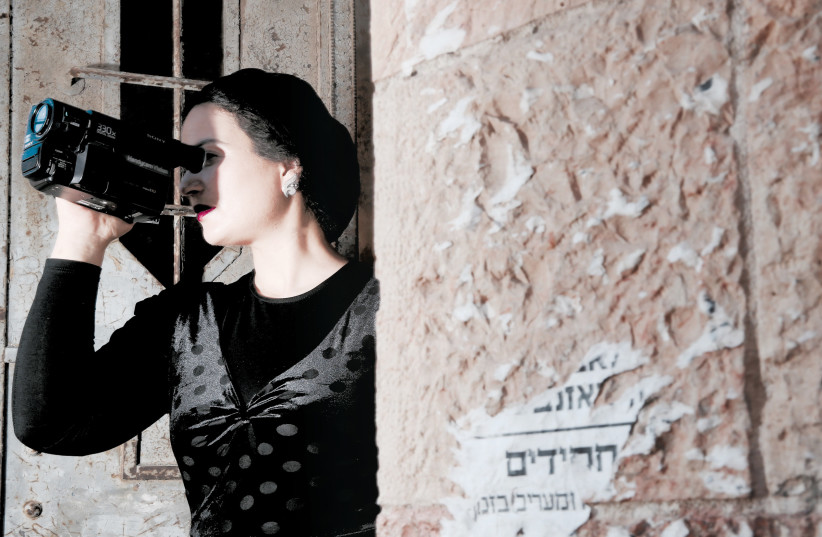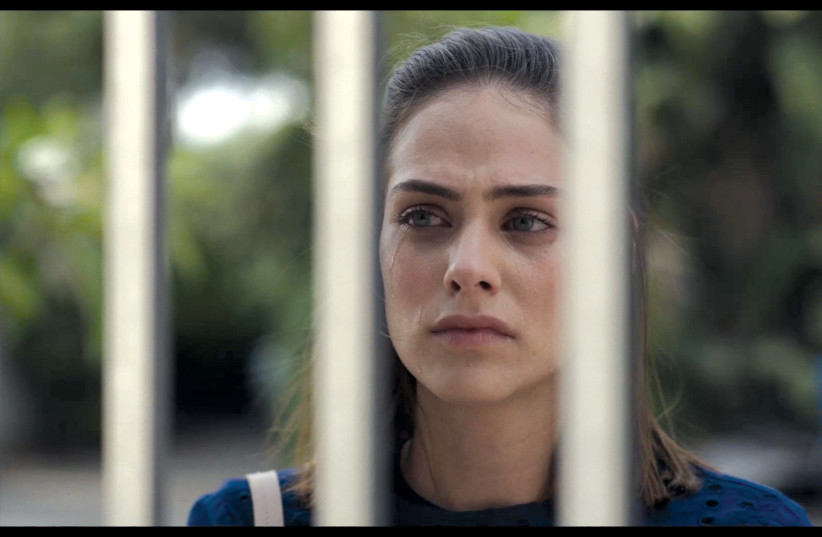Well into the 21st century, with a plethora of social media channels of communication at our quick-fire disposal should we so wish, do we still take what we get from the TV and online and print press as the gospel truth?
There must be thousands of behaviorists of various ilks out there earning a handsome living from analyzing – and imparting their learned findings thereof to all and sundry – the images we are fed with, and how they form our take on life around us.
That is particularly pertinent when it comes to areas that we do not readily access on our everyday rounds, and of which we have no or little firsthand knowledge.
What, for example, does the average secular or traditional Jewish Israeli know about the haredi community? That is, other than the footage they – presumably – see on the news or news websites which invariably highlight some flashpoint or other, with bearded, black-garbed men vociferously airing their opinions and, possibly, getting in some fisticuffs in the process.
The same goes for the stock image of the haredi woman who, one assumes, has anything upward of half a dozen offspring and spends all her time keeping house and ensuring her children and husband are well fed, provided with clean laundry and the other necessities of life.

Marlyn Vinig answers to some of that blanket profile, with the accent very much on the “some.” She does have seven children and even a grandchild, but the fortysomething Jerusalemite gets up to more than just keeping house, much, much more.
Let’s start with Kolnoa Mishelahen (Their Own Cinema), which Vinig recently published. The close-to-300-page Hebrew-language tome also goes by the explanatory subtitle of The New Female Wave of Ultra-Orthodox Cinema. What? I hear many ask. What, pray tell, could possibly be the connection between “female” and “ultra-Orthodox cinema”? And how could the latter even exist?
Leafing through the book, which is based on Vinig’s doctoral thesis, one gets the distinct impression that there is a lot more to the Israeli haredi community than one gets from the aforementioned means of disseminating information. That goes for Vinig, too.
When she’s not tending to her domestic chores, Vinig, who was born in Australia to liberal Jewish Israeli parents and came here at the age of three, is a highly visible member of the Israeli cinema sector.
When she’s not busy screenwriting or scriptwriting, she’ll rustle up a poem or two, give a lecture, research some oblique field of filmic interest or, maybe, write an article. Her manifold professional hat rack also includes critiques and, a month or so ago, she reviewed some items shown in the 2021 Gay Film Festival. Clearly, we are not talking about a line-toeing member of the haredi community here.
THAT, NATURALLY, is hard-to-resist fodder for the media guys and gals who have a penchant for employing neat, user-friendly pigeonholing that “everybody” understands. We all know what a haredi woman looks like, and how she passes her time, right? Well, if you do happen to sit down with Vinig for a couple of minutes, you might be forced into a radical rethink.
I wondered whether she might be getting tired of being appraised based on her religious attire appearance rather than on her gifts and professional pursuits.
“I write poems – I have published two poetry books – I write scripts. Anything I create I, first and foremost, create it. I don’t think about whether or not I am haredit,” she states with no little conviction. “I know there are people who are always judging me based on that.” Presumably the latter refers to haredi community members. “They are very worried about what people will say. I don’t have that fear, maybe because I am a ba’alat teshuvah. Or maybe it’s because I don’t portray myself as some kind of martyr representing something or other. I just put myself out there, as I am – freestyle.”
She is also aware of the typecasting propensity displayed by the mainstream secular media.
“Yeah, they talk about ‘the haredi critic’ or ‘the haredi poet’ and all that,” she laughs. “I just think that people are very curious about these associations. You know, my husband is a yeshiva student, and my kids speak Yiddish. These are the things that pique [secular] people’s interest.
“They think we are here, part of the enlightened Western world, and the haredim are over there in a different world; they are not connected to us at all. They think, maybe, haredim still live the life of Polish Jewry, or something like that.”
If that is the case, anyone laying their hand on Kolnoa Mishelahen is in for a rude awakening.

It seems that the strides made in silver screen entertainment options, in religious society, have much to do with the efforts of women – primarily of similar haredi leanings to Vinig – such as Dina Perlstein, the first female haredi filmmaker, Tzili Schneider and Rama Borstein. That may also have something to do with the generous exposure the ultra-Orthodox lifestyle as a whole, around the world, has received in recent years through, for example, the Emmy Award-winning miniseries Unorthodox, starring Shira Haas. That was preceded by the popularity of Israeli TV series Shtisel, which started in 2013 and ran for three seasons through to 2021. Haas was also in that, alongside Doveleh Glickman and Michael Aloni, and set the cat among the proverbial haredi pigeons in that role, too.
Vinig has guts and, judging by Kolnoa Mishelahen, a treasure chest of knowledge about her chosen profession and how activity in the business is gathering a remarkably healthy head of steam within ultra-Orthodox circles.
This is her second book on the general topic of haredi cinema, a full 10 years after her debut offering, Orthodox Cinema. It is a fascinating and learned read which tracks the exponential evolution of the sector since 2011. As she notes in her foreword: “The research I have conducted over the past decade, on haredi cinema, largely revitalized my life and changed it.”
VINIG COMES across as an amiable character who wouldn’t hurt a fly. But she’s had to tough out some pretty hairy situations over the years while trumpeting the cause of ultra-Orthodox women and their right to step outside the strict confines of their traditional wife-mother role. That might include, for example – shock horror! – trotting along, probably after putting the kids to bed, to their local community center or some other suitably proportioned facility and settling down to watch a feature film or documentary. Naturally, that would take place exclusively in the company of other haredi women.
There seems to be plenty out there to watch. And, intriguingly, because male haredi folk are generally expected to spend their time on more spiritually gainful activities than watching or – certainly – making movies, some male filmmakers have had to work under a female nom de plume. One such is 47-year-old haredi director Yehuda Grovais, whose bulging filmography includes five works made for exclusively female audiences, with all-female casts, such as Matkon Sodi (Secret Recipe).
Much of the story-line material feeds off a lifestyle, and issues, that most haredi women will readily identify. However, there is also the odd movie that takes on subject matter of a more worldly, universal nature.
Chief among the professionals in that regard is Perlstein and, in particular, her 2021 thriller, Shattered, which featured acclaimed Spanish actress Cristina Plazas as well as our very own grande dame of the silver screen, evergreen octogenarian Gila Almagor.
As far as Vinig is concerned, it’s all “just” cinema. “When I approach a job, say a review of a movie or a book, I don’t check where the filmmaker or author comes from, what they look like, how they live. I judge the work as a work of art and nothing else.”
At the end of the day she says it is a matter of professionalism and the quality of the end product. “The language of culture, of art, of cinema, is a language in its own right. All the politics of identity are valueless. The work has to be good. No one is going to make allowances if the filmmaker is haredi, an Arab or Eritrean. You just have to create good art.”
The same goes for a secular filmmaker looking in from the outside. Patrons of last year’s Jerusalem Film Festival may have caught Women of Valor, directed by Anna Somershaf, over at the Jerusalem Cinematheque. The 75-minute documentary digs into a veritable haredi powder keg, and follows Esty Shushan and a bunch of courageous like-minded women from the ultra-Orthodox community in their fight for equal rights, specifically the right to run for political office.
The stark statistic cited at the start of the film conveys the basic premise that 600,000 haredi women in Israel have the right to vote but are unable to have any say about – as Shushan notes in a radio interview – the condition of the public playgrounds where their children go every day.
Somershaf says the fact that she is not religious afforded her a fly-on-the-wall viewpoint. “If I’d come from within the community, perhaps there would have been all sorts of things that I would not have consciously seen, and documented, because I would have been used to them.”
That, she says, was crucial to the work at hand and the documentary bottom line. “I approached the project nonjudgmentally and with an open mind. I think that, if I’d come from the community, I wouldn’t have realized just how significant the events were, and how brave these women are.”
The result of that evenhanded ethos is a film that tells an emotive story with a plaintive message that still needs to be addressed. Still, Somershaf feels things have started to move in the desired direction, with the help of her craft and co-professionals. “If I didn’t believe that cinema in general, and specifically this film, could, to some extent, affect reality, I wouldn’t have worked on it for five years and invested my own cash in it.”
She also harbors the hope that her work, and the work of other filmmakers, that features the cloistered haredi world, will contribute to a more accepting way of thinking, both from within the ultra-Orthodox community and the secular majority.
“My film tries to break down those walls,” she declares. “This discrimination [against haredi women] is possible because even the most liberal [secular Jews] say it’s their problem. It doesn’t impact on us. Let them sort it out for themselves. We, by and large, have a divide and rule mindset.”
If she had any doubts about it before, Somershaf’s work on Women on Valor convinced her that we are all in this together, whether we like it or not. “What happens in the haredi sector affects us all, including secular Israelis and the public domain.”
The documentary has been making waves since its triumphant Jerusalem screening, and Somershaf hopes it will find its way to film festivals in the States and elsewhere.
Meanwhile, Vinig is looking to push things along back here. She has served – yes, as a haredi woman – on a number of official cinema boards and executive bodies and, just this week, was appointed to the highly prestigious and influential Second Authority for Television and Radio Council.
“It is so difficult to get funding for haredi films, and especially for movies made exclusively by women for female audiences,” she notes. “That has to change.”
Kolnoa Mishelahen is published by Resling Publishing, as part of its Cinema Series.
